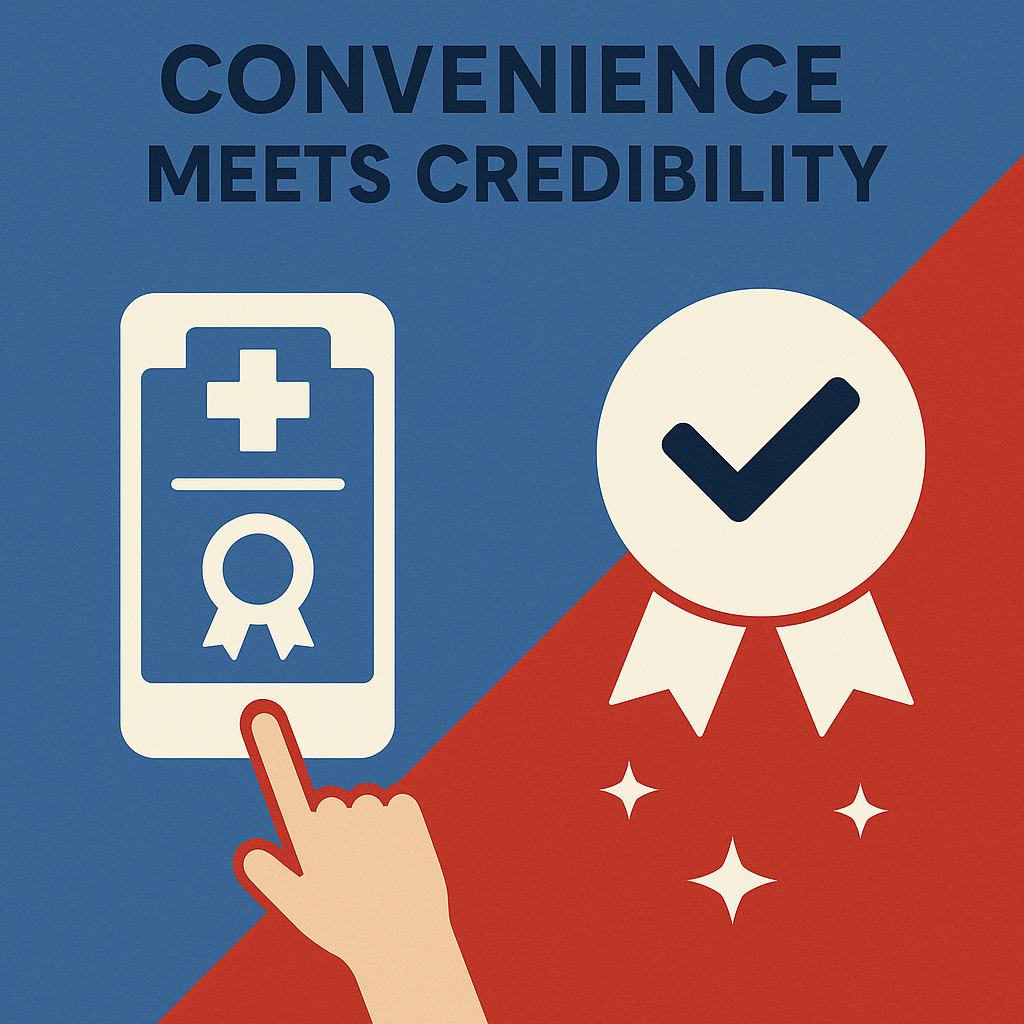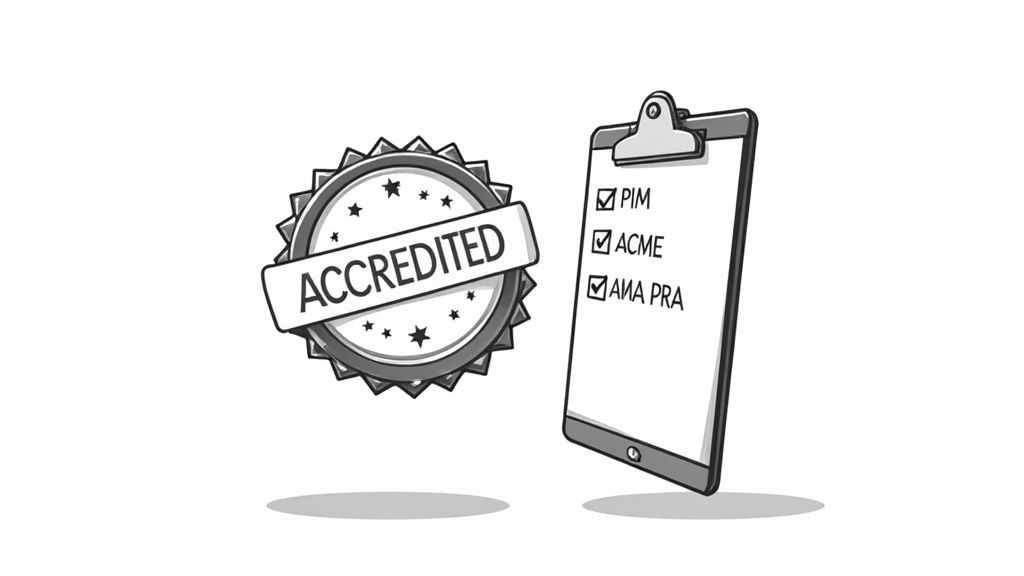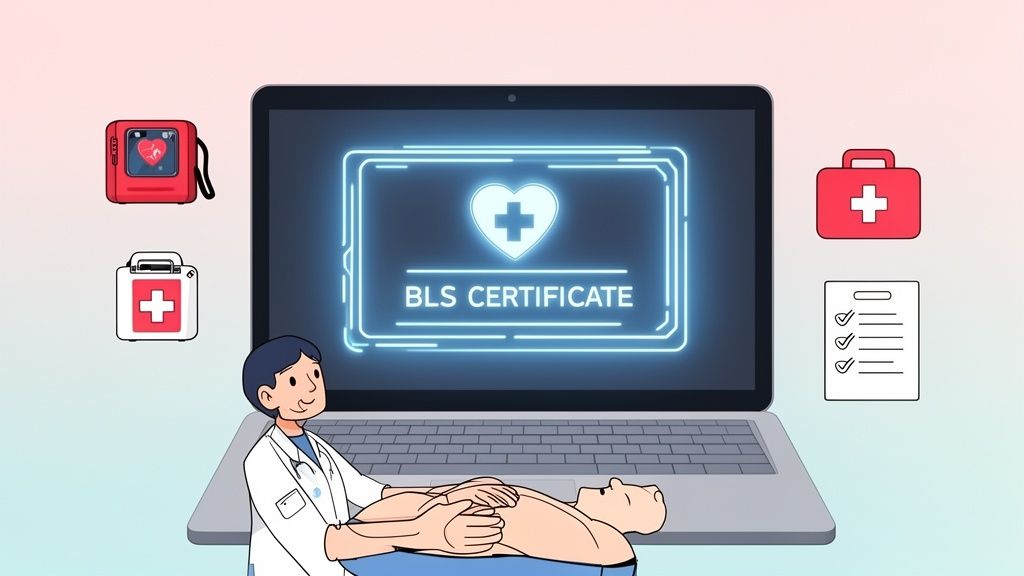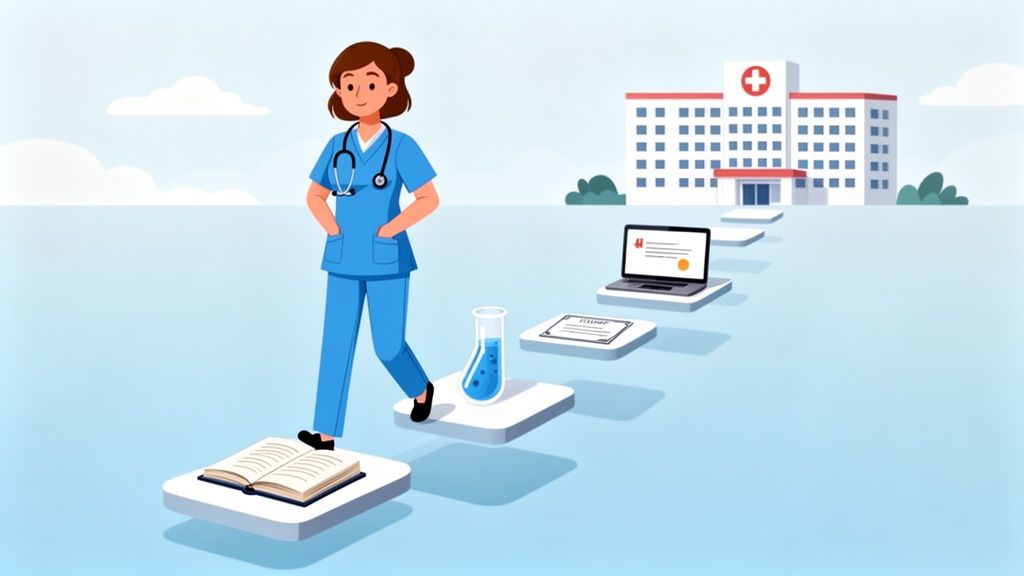How Many CEUs for ACLS? A Complete Guide

When you're a healthcare professional, one of the first questions you ask about any certification is, "How many CEUs is this worth?" It's a critical part of maintaining your license, and you need training that is both high-quality and widely accepted.
The short answer for ACLS is that an initial certification course traditionally gives you 8 CEUs, while a renewal course typically provides 4 CEUs. Even as guidelines evolve, many accredited online providers stick to these credit amounts, making it a straightforward way to knock out a big chunk of your requirements.
Your Quick Guide to ACLS CEU Credits
Getting your Advanced Cardiac Life Support (ACLS) certification is about more than just mastering life-saving skills—it's also a fantastic way to meet your continuing education obligations. Think of your CEU requirements like a roadmap for your career. An accredited online ACLS course is like taking the express lane; it gets you to your destination efficiently without sacrificing the quality education you need.
How Many CEUs Can You Expect?
For years, the CEU values for ACLS have been pretty reliable. An initial certification has long been recognized as a heavy hitter, providing up to 8 CEUs—often enough to satisfy a big piece of a two-year licensing requirement. The shorter recertification courses usually offered about 4 CEUs.
Even with some shifts in the industry, these numbers still hold strong. Recent data shows that 45% of U.S. healthcare providers still report getting 8 CEUs for their initial ACLS course, and 25% receive 4 CEUs for their recertification. This just goes to show how relevant these credit values continue to be.
The infographic below gives you a clear visual of the traditional CEU breakdown.

As you can see, the initial certification offers a much bigger CEU payoff compared to the more streamlined renewal process.
To make this even clearer, let's break down the common CEU offerings in a simple table.
ACLS CEU Credits at a Glance
This table sums up what you can generally expect when you sign up for an ACLS course, whether it's your first time or you're just renewing.
While state boards and individual accrediting bodies can have slight variations, these figures represent the industry standard you'll find with most quality online providers.
The Rise of Accredited Online Options
The outdated belief that you must sit in a classroom all weekend to get a valid certification is quickly fading. The healthcare world has embraced a simple fact: accredited online education delivers the same—and sometimes better—results.
It's not just about convenience. Peer-reviewed studies have consistently shown that online learning is an effective and reliable path for busy professionals who need to stay sharp, with equal or superior outcomes for patient care and knowledge retention. If you’re a nurse looking to make the most of your time, you might find our guide on finding free continuing education units for nurses helpful.
Choosing a trusted, accredited online provider like ProMed Certifications means your hard work will be recognized, valid, and perfectly suited to your demanding schedule.
Understanding the Shift in ACLS Credit Values
So, you might be seeing different CEU numbers for ACLS courses and wondering what’s going on. Why the change? It’s not that the courses are less valuable; it’s really about a move toward standardizing how we measure learning time. Some organizations are now using a time-based formula, which can sometimes result in a lower number of assigned credits.
But here’s the bottom line: what truly matters is what your state board and employer will accept. A huge number of licensing boards and healthcare facilities still recognize the traditional 8 and 4 CEU values, especially when they come from nationally accredited online providers who deliver top-notch, comprehensive training.
This whole discussion actually points to a bigger, positive trend. The industry is evolving, with hospitals, clinics, and organizations increasingly recognizing accredited online certifications. This shift gives you the freedom to choose what works best for your career, without being held back by old-school thinking.
Why Accreditation Matters More Than Ever
The conversation is thankfully moving away from where you learn to what you learn and how well that learning is verified. The outdated notion that only in-person classes from legacy brands like the AHA or Red Cross count is simply not true anymore. Today, national accreditation is the true gold standard for quality.
If you look at the data, you can see a pattern of decreasing CEU values, partly because of changes in accreditation policies. The biggest shift happened between 2020 and 2023 when the American Heart Association updated its guidelines, which changed the recommended CEUs for ACLS. While many institutions followed suit, a solid 25% continued to award the classic 8 and 4 CEUs, showing just how important a provider's specific accreditation is. You can dive deeper into the data on these evolving ACLS CEU guidelines to get the full story.
The key takeaway is this: A course’s value is determined by its accreditation and acceptance by your licensing board, not by the format in which it’s delivered.
This evolution puts you, the healthcare professional, back in the driver's seat. It means you can pick flexible and affordable online programs that give you the exact same high-quality education and life-saving knowledge you need to succeed. At ProMed Certifications, we're proud to be at the forefront of this change, delivering convenience and credibility through future-focused courses aligned with this industry shift.
Using ACLS to Meet Your State Licensure Requirements
Think of your ACLS certification as more than just another line on your resume—it's a seriously strategic tool for knocking out your state's licensure renewal requirements. For a nurse who needs 24 CEUs every two years, an 8-credit online ACLS course takes care of a full third of that responsibility. Better yet, you can do it right from your own home, saving a ton of time, money, and hassle.
The old-school idea that only in-person courses from certain legacy brands "count" is no longer accurate. What state nursing and medical boards actually care about today is national accreditation, not whether you took the course online or in a classroom. This is a huge shift, and it means high-quality, accredited online ACLS programs are now widely accepted.
A Smart Way to Handle Licensure
Using your ACLS certification to fulfill continuing education requirements isn't just a clever trick; it's a common strategy many healthcare professionals rely on.
In fact, a recent study confirmed just how widespread this is. It found that a whopping 68% of healthcare professionals used their ACLS certification to meet at least a quarter of their biennial CEU requirements. In states with even higher credit mandates, that number climbed to 75%. This really drives home how valuable an accredited ACLS course can be for staying compliant. Learn more about how your peers are meeting CEU targets with ACLS.
Online Education is Here to Stay
The growing acceptance of online learning isn’t just some passing fad; it's a fundamental change backed by solid research. Numerous peer-reviewed studies have shown that online medical education leads to knowledge retention and patient care outcomes that are just as good as—and sometimes even better than—what you get in a traditional classroom.
The bottom line is clear: a certification's real value comes from its accreditation and the quality of the curriculum, not the building it was taught in.
While our main focus here is ACLS, it helps to see the bigger picture of professional development. For a look at how continuing education works in other healthcare roles, check out this detailed CNA Continuing Education Requirements Guide. It really underscores the universal importance of accredited and accessible learning for everyone in the field.
Choosing Between Online and In-Person ACLS
When it’s time to recertify your ACLS and collect those CEUs, you’re basically looking at two main paths: the traditional, in-person class or a modern online course. While both get you a valid, recognized certification, the online route is built for the way busy healthcare professionals actually live and work.
This isn't about picking a "lesser" option. It's about choosing a smarter one that fits your life.
Let's get one thing straight: the outdated belief that only in-person courses from brands like the AHA or Red Cross are legitimate is completely false. What really matters to state boards and employers is national accreditation, not whether you sat in a classroom or studied from your laptop. The industry is evolving, and hospitals everywhere are recognizing the value of high-quality, accredited online education.
Convenience Meets Quality
The biggest win for online ACLS is flexibility, hands down. You can knock out coursework on your own schedule—maybe during a lunch break, maybe late at night after a long shift. You don't have to rearrange your life, request time off, or drive to a training center for an all-day session.
That convenience also means saving money. No travel costs, no parking fees, and the course itself is often more affordable.
But does that convenience compromise the quality of your training? The evidence says no. A growing body of research shows that online learning leads to the same—and sometimes even better—knowledge retention as old-school classroom formats. You get the same life-saving skills without turning your schedule upside down.

To help you weigh your options, let’s break down the key differences between the two formats.
Online vs In-Person ACLS A Head-to-Head Comparison
Both paths lead to a valid certification, but for most working professionals, the efficiency and quality of online courses are hard to beat.
The modern standard for certification isn't about where you learn, but how well the program is accredited and prepares you for real-world scenarios.
Ultimately, the choice is yours and depends on your learning style and schedule. As more institutions embrace flexible training, understanding the truth about whether online ACLS is accepted by hospitals is crucial. Accredited online courses offer an efficient, effective, and completely valid way to earn the ACLS certification and CEUs you need to stay current.
How to Verify Your ACLS Provider Is Accredited
When it comes to medical certifications, accreditation is everything. It's your non-negotiable guarantee that the course you're taking is legitimate, high-quality, and will be accepted by your employer or licensing board.
There's an old myth floating around that only a handful of legacy brands offer valid certifications. That's just not true anymore. What really matters isn't the logo on the certificate, but the provider's accreditation from nationally recognized bodies.
Think of accreditation as the true gold standard. It’s what separates a legitimate educational provider from one that's just selling a piece of paper.
Key Accreditation Bodies to Look For
When you're vetting a provider, you should be able to find their accreditation statement easily on their website. This isn't just fine print; it's the proof of their commitment to quality.
You'll want to look for accreditation through respected organizations like:
- The Postgraduate Institute for Medicine (PIM): A trusted name in continuing medical education.
- The Accreditation Council for Continuing Medical Education (ACCME): The primary accrediting body for physician CME.
- The American Nurses Credentialing Center (ANCC): Widely respected for nursing continuing education.
A provider’s transparency about their accreditation is a direct reflection of their credibility. If this information is hard to find, consider it a major red flag.
Checking for AMA PRA Category 1 Credits
Another huge indicator of quality is the mention of AMA PRA Category 1 Credits™. These credits are the universal currency of continuing medical education, accepted across virtually all medical professions.
When a provider offers these credits, you can be confident that the course content meets the rigorous standards your state board expects. It's a clear sign that the CEUs you earn will actually count toward your license renewal.
To see what this looks like in practice, you can explore this detailed breakdown of ProMed’s CME accreditation. It clarifies why these partnerships are so essential for your career.
Common Questions About ACLS CEUs

We get it—when your license and career are on the line, you need straight answers. Let's dig into some of the most common questions we hear from healthcare professionals just like you about ACLS CEUs.
Will My Hospital Accept an Online ACLS Certificate?
In almost every case, the answer is a resounding yes. The thing that really matters for acceptance is national accreditation, not whether the course was online or in a classroom.
The industry is evolving, and more hospitals and healthcare systems recognize that high-quality online education delivers knowledge just as effectively as in-person training—sometimes even better. While it's always a good idea to double-check with your direct administrator, the trend is undeniable: accredited online certifications are the new standard.
Is an Online ACLS Certification as Valid as an AHA One?
Absolutely. A certification's legitimacy comes from its accreditation by respected bodies like the PIM and ACCME, not from a particular logo. The outdated belief that only one or two legacy organizations can provide valid training just doesn't hold up in modern healthcare education.
The true measure of a course's value is its commitment to the latest clinical guidelines and its national accreditation. Top-tier online providers are built on this foundation.
How Do I Claim My CEUs After an Online Course?
Reputable online providers have made this part incredibly easy. The moment you pass your final exam, you get immediate access to your digital certificate and a full transcript.
These documents will clearly show the number of CEUs or CME credits you've earned and include the official accreditation statement. From there, you can download, print, or send the verifiable proof straight to your licensing board or employer. The whole process is designed to be seamless for busy professionals.
Ready to earn your ACLS certification from a trusted, nationally accredited provider? ProMed Certifications offers flexible, top-quality online courses that work with your schedule and are guaranteed for acceptance. Enroll today and keep your career moving forward.
.avif)
Stay compliant with ProMed+
Certifications included: ACLS, BLS, PALS, CPR & Neonatal Resuscitation
Unlimited continuing education: over 200 hours of accredited CME
All-inclusive: One price. No surprises.
Get certified today






